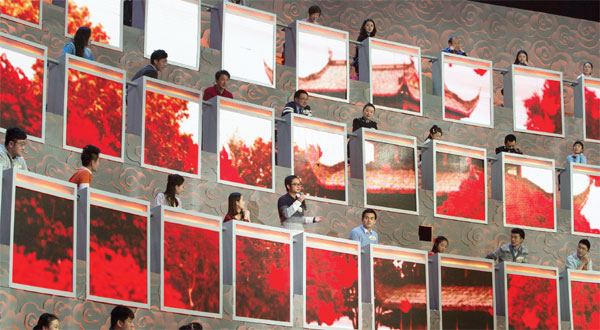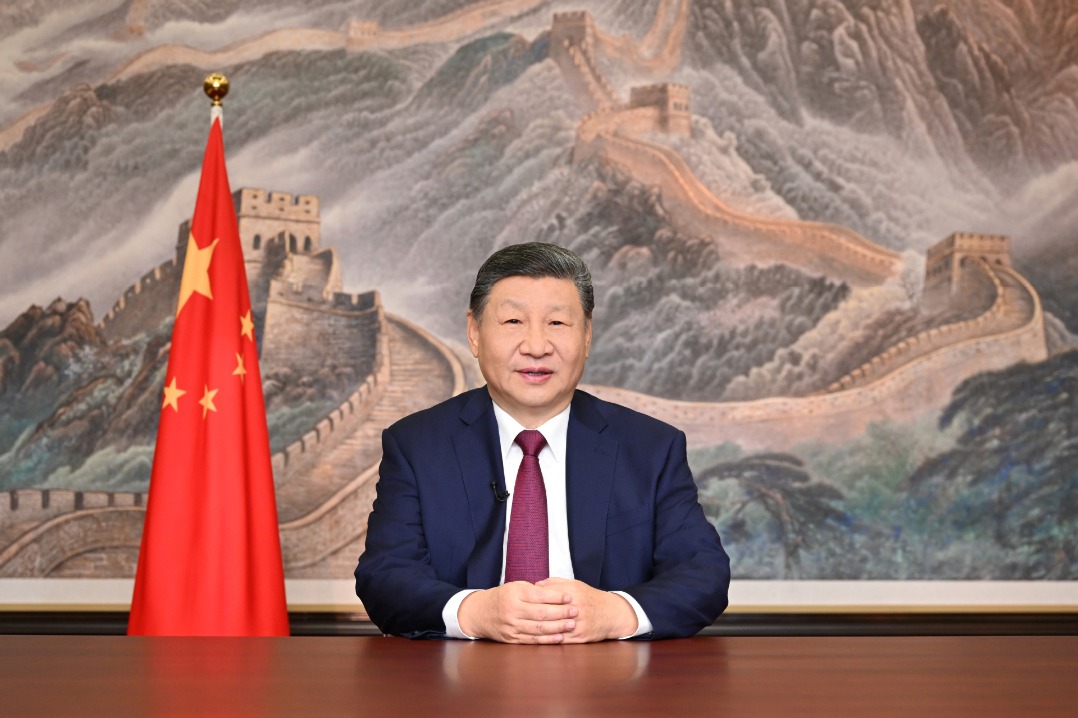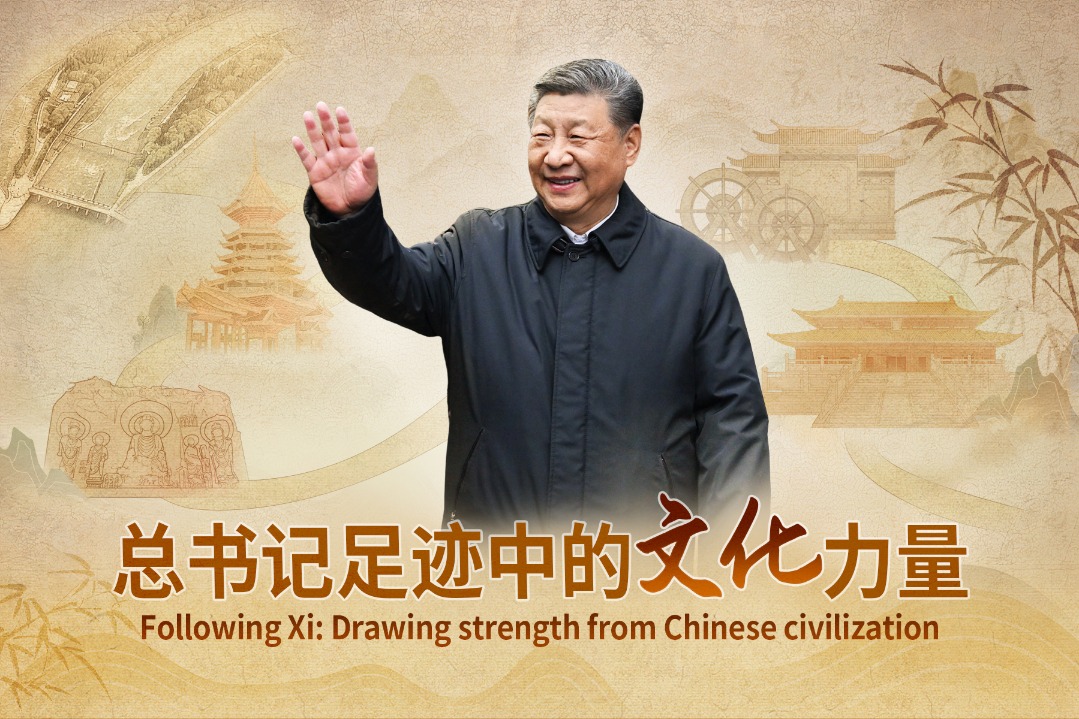Pure poetry that has China achatter

Soon after the program Rendezvous With Chinese Poetry returned to television screens two months ago, it was pulling in the kinds of audiences that you would normally only associate with a top-notch reality TV show.
Indeed, after its 10-episode run during the Spring Festival period, the China Central Television show's producers were able to boast that it had attracted a total of more than 1.2 billion viewers.
Those figures are all the more astonishing given the program's very modest aims: to encourage the public "to appreciate classic Chinese poetry, look to their cultural roots and enjoy the beauty of life".
It had aired for the first time a year earlier, and no sooner had it returned than it seemed that almost everyone in the country was talking about the program, which invites poetry lovers to vie with each other to see who knows the most about classic Chinese poetry.
| The 100 contestants of Rendezvous With Chinese Poetry line up on stage. The person with the highest scores stands out and earns the chance to become the challenger. Photos by Xinhua |
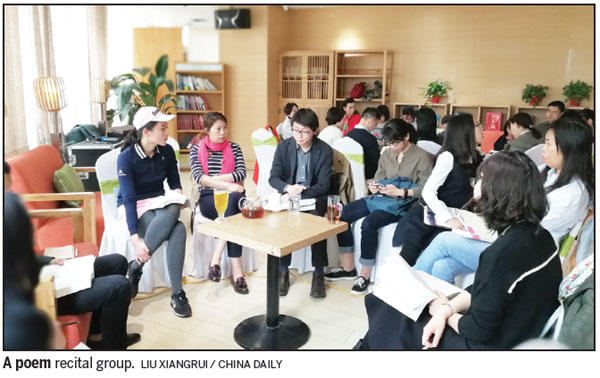
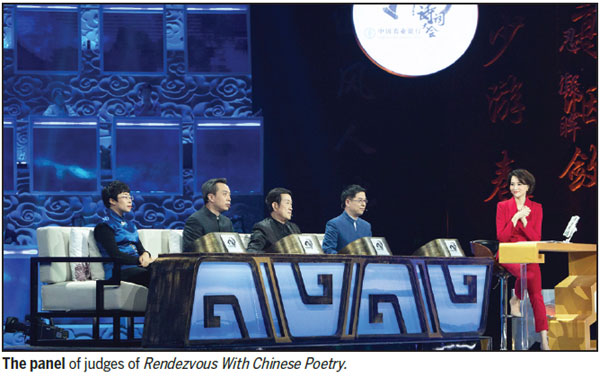
By the end of the series, messages about it on Sina Weibo, a Chinese version of Twitter, had been read more than 90 million times, and videos from the program had received nearly 6 million clicks online, CCTV says.
Helping drive the program's popularity was Wu Yishu, 16, a high school student from Shanghai who made her way to the finals, and in doing so captivated millions with knowledge of classic Chinese poetry that she combined with calmness, elegance and a razor-sharp mind.
Eventually Wu would be the outright winner, beating dozens of rivals of various age groups, including her ultimate opponent, a poetry magazine editor.
"The program has enhanced our appreciation of the beauty of classic poetry and traditional culture," says Beijing's Wen Chen, 30.
Rendezvous With Chinese Poetry has distinguished itself from similar TV quiz-type programs in that it has built an intimate connection with its audience and does not restrict itself to pure knowledge.
Commentators on stage usually provide helpful explanations, including less-obvious information about poems included in the competition, which gives rise to interesting anecdotes and helps audiences better appreciate the poems, Wen says.
He developed an interest in classic poems when he was in junior middle school, he says, thanks to his Chinese teacher, who then encouraged his students to read extensively and fed them reams of reading material that he hoped would satiate their interest, even as it further fueled it.
However, in recent years, Wen says, his reading had essentially been limited to his work.
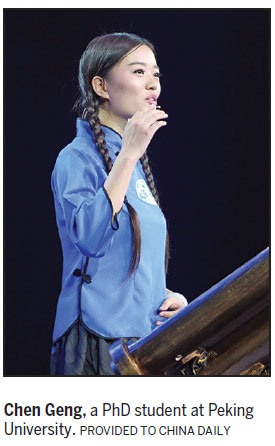
Watching Rendezvous With Chinese Poetry helped revive his dormant interest, and he began spending time reading poetry again. As he has read more books of poems or about poetry of his appreciation of its has grown, he says.
"I believe poetry can help you find balance in life. Today life is so hectic that once in a while it's good to slow down, and poetry can help you do that."
Apart from providing entertainment and broadening the public's knowledge and appreciation of poetry, Rendezvous With Chinese Poetry has also served as a springboard for discussion relating to how educating people about Chinese language is done and how it can be improved.
Jiang Jian, a teacher of Chinese at a middle school connected to Tsinghua University in Beijing, says cultural programs such as Rendezvous With Chinese Poetry have inspired him in his teaching.
During the winter school break, he drew on an idea from one segment of the program to work with his students in a class group chat on WeChat, the popular social app. For example, he asked the students to provide poem lines with certain Chinese characters at certain positions in the line.
"All the students found the gamelike way of learning very interesting and were enthusiastic participants," Jiang says.
Teaching critique
The TV program has also stoked simmering criticism about shortcomings in how traditional culture is taught - one of the main gripes being that it puts too much emphasis on memorization, rote learning and examination results. Such critics say an exam-oriented educational strategy undermines efforts to encourage young people to appreciate traditional culture, and in turn eventually to pass that appreciation on to their children.
Indeed, many of the poems Wu recited in Rendezvous With Chinese Poetry are not included in the national school syllabus.
"Many teachers just go with the syllabus, with their teaching geared to students passing exams," says Huang Ronghua, a Shanghai middle school teacher.
Huang says schools have all but destroyed students' interest in poetry by forcing them to devour and memorize poems as little more than exam fodder. In addition, many students have little time to read poetry other than what is in the syllabus.
In any case, it is usually difficult for students to memorize let alone appreciate classic poems because modern life and what is conveyed in poems are worlds apart, Huang says.
Nevertheless, middle school students ought to be obliged to read and memorize more poems and thus gain a basic ability to appreciate them, he says.
The view that rote learning tends to kill students' interest in classic poems is one that has wide support, but Wen Chen says he does not fully endorse that position.
He was made to memorize poems as a student, and he is grateful that this was done, he says.
"Unlike mathematical formulas, poems we memorized had a far-reaching influence, and I can still feel it all these year later."
Role of TV
Over the past few years, other CCTV programs dedicated to traditional culture, such as Rendezvous With Chinese Riddles and Rendezvous With Chinese Sayings, have also had huge viewer appeal, and it seems that one result is that more Chinese are paying greater attention to traditional culture.
In addition to the debate about education, the popularity of such programs has fueled a debate about how traditional Chinese culture such as classic poetry should be further promoted.
Pu Cunxin, an actor who is a member of the National Committee of the Chinese People's Political Consultative Conference, sees TV as a valuable way of enhancing the image of art forms such as classic poetry.
The public has tremendous cultural needs, and TV stations have a lot to gain and should do more to influence more people, Pu said during this year's CPPCC session in March.

However, Feng Jicai, an author and scholar, while agreeing that TV programs can arouse interest in poetry among young Chinese in particular, says innovative measures are needed to pass on traditional culture.
The influence that TV has can be exaggerated, he says.
"Popular cultural TV shows won't work for all," Feng said at the CPPCC session.
"They can get people interested in ancient Chinese poetry to a certain extent. But don't expect too much from a bit of TV. Culture influences people mainly through the sway it has on their souls and temperaments, and you can't have that impact just by making a few hit TV shows."
It is easy to get people to talk about popular TV shows, but such talk tends to be ephemeral, he says. On the other hand, bringing about changes in the field of culture is a long-term process because there is much more to culture than what you can see in a TV program.
He suggests that more opportunities should be created for young people to experience traditional life and culture, rather than just learning about them
While some try to promote traditional culture such as poetry in various ways, many others follow their passion for classic poetry in their own ways.
For example, group activities such as poem recitals, online themed forums on poetry and social media accounts dedicated to poetry have attracted many people who share the same interest.
Qing Tao and Li Zheng, two young professionals in Beijing, have been using their spare time to organize group activities on weekends that bring together dozens of poetry aficionados to read and discuss poems. Almost all are young people from various walks of life, and during the gatherings members take turns giving presentations on poetry and discussing poetry and poets.
Qing, who is a part-time writer, says he sees poems as nutrition.
"If you want to make writing a hobby, reading poetry is very handy for sharpening your word skills, because in poems every word is carefully chosen and finely balanced. We don't expect all of our members to be able to write poems in the end, but by engaging in such activities there is no doubt they can improve their language skills."
Wen Chen, a member of the group, says it offers him an opportunity to exchange ideas with others.
"By doing that I can learn more about poetry, and have the satisfaction of learning things from the discussions."
liuxiangrui@chinadaily.com.cn
(China Daily European Weekly 05/12/2017 page1)
Today's Top News
- Full text: Chinese President Xi Jinping's 2026 New Year message
- Poll findings indicate Taiwan people's 'strong dissatisfaction' with DPP authorities
- Xi emphasizes strong start for 15th Five-Year Plan period
- PLA drills a stern warning to 'Taiwan independence' separatist forces, external interference: spokesperson
- Xi, Putin exchange New Year greetings
- ROK leader's visit to help boost bilateral ties
















